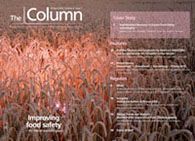QMS compliance achieved
Agilent Technologies has released a statement reporting that its portfolio of DNA microarrays is now manufactured under ISO 13485 certification, a recognized standard for quality management systems (QMS).
Agilent Technologies has released a statement reporting that its portfolio of DNA microarrays is now manufactured under ISO 13485 certification, a recognized standard for quality management systems (QMS).
Robert Schueren, Agilent vice president and general manager, Genomics and Life Science Reagents, commented, “Agilent has always emphasized quality in the manufacture of microarrays and we’re very pleased to be adding the validation of ISO 13485-registered QMS on top of our existing ISO 9001 standard.”
Additionally, the company is preparing to take the next step in pursuing clearance from the US FDA for a cytogenetics platform, according to vice president and general manager of the Biological Systems division, Gustavo Salem.
For more information on the company and its products visit the website at www.agilent.com
This story originally appeared in The Column. Click here to view that issue.

Silvia Radenkovic on Building Connections in the Scientific Community
April 11th 2025In the second part of our conversation with Silvia Radenkovic, she shares insights into her involvement in scientific organizations and offers advice for young scientists looking to engage more in scientific organizations.
Regulatory Deadlines and Supply Chain Challenges Take Center Stage in Nitrosamine Discussion
April 10th 2025During an LCGC International peer exchange, Aloka Srinivasan, Mayank Bhanti, and Amber Burch discussed the regulatory deadlines and supply chain challenges that come with nitrosamine analysis.











